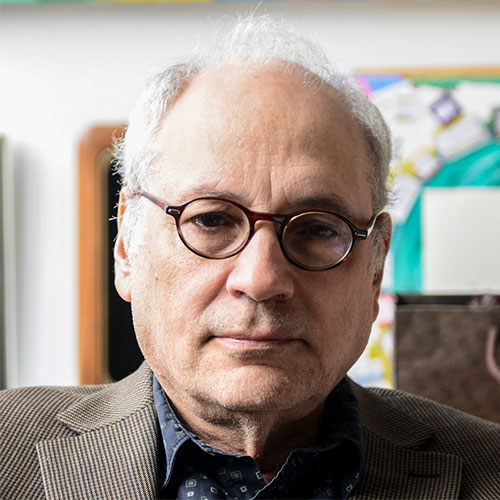Visiting Poets
Charles Bernstein
Charles Bernstein was proclaimed by the literary force Marjorie Perloff to be “one of the central chroniclers of our culture.” At the forefront of L=A=N=G=U=A=G=E poetry, wherein meanings are pluralized and involve not narrative but suggestion, sound, technical ingenuity, and ultimately, derangement/ rearrangement of the senses, he is ever alert to the possibilities of worlds within words. But Bernstein is much more than the sum of the complicated parts that make up Language Poetry; he is a relentless collector of the artifacts of American civilization, which he gleefully tucks into his work.
Author of over thirty books of poetry, essays, and lyrics, Bernstein brings rare wit, irony, and a roving intelligence to his roles as critic, essayist, artist, and musical collaborator. Geoff Ward of the Boston Review praises his latest work, With Strings, for “startling and genuinely new thinking on identity politics, the aesthetic, cultural studies, poetry as performance art, and what Bernstein terms ‘close listenings.’” In his many incarnations, Bernstein has founded a radio poetry series, LINEbreak, explored the juxtaposition of text and art (working with his wife and great collaborator, the artist Susan Bee, on such books as Log Rhythms), as well as creating sly and inventive art himself. He curated, with Jay Sanders, an exhibition of Poetry Plastique, in his words, “not poems about pictures but pictures that are poems.” He has made a specialty of composing vivid yet surreal librettos with the composers Ben Yarmolinsky, Dean Drummond, and Brian Ferneyhough.
In virtually all of this work, Charles Bernstein shines with integrity and humor as an artist/innovator who sees through cultural pretense to the place where the “world of the poem” can be “unsealed,” broken through to as a living, breathing thing: “For my poetry is informed by/ something inside that doesn’t/ flinch & won’t budge. & I/ could never have done it alone./ I may work in the factory but I glide/ to the music of the anemones.”
Honored with the prestigious Roy Harvey Pearce /Archive for New Poetry Prize for his lifetime contribution to poetry and scholarship, fellowships from the Guggenheim and NEA foundations, Bernstein is currently the Donald T. Regan Professor of English at the University of Pennsylvania.
Select Poems
She walks in beauty like the swans
that on a summer day do swarm
& crawls as deftly as a spoon
& spills & sprawls & booms.
These moments make a monument
then fall upon a broken calm
they fly into more quenchless rages
than Louis Quatorze or Napoleon.
If I could make one wish I might
overturn a state, destroy a kite
but with no wishes still I gripe
complaint’s a Godly-given right.
From ROUGH TRADES (Sun & Moon Press, 1991)
Behind every figure stands another
insisting to be seen; but this is just
a temporary lapse. I went toward the sign
and loaded up. It was so obvious
I didn’t see why I hadn’t thought of it
before. Imaginary pain began to sing
in my right leg. I turned around and looked
back. The shining silver fog
seemed to coalesce and solidify, like a
roof. Soon we were drifting
past Goethe Avenue’s sprawling
stone mansions. A row of skulls
stood as bookends. I went
three blocks and passed three lamps;
but the thing I wished to say
instantly fractured into incoherence.
That was the point: the world was gone
but he was interested. And there
was envy in his irritation, just as
the edges started to melt.
A dense gauze of grayish silver light
parted as we passed through
and into it, reforming itself
at a constant distance of four
or five feet. This is where I
dip my buckets, where I fill my pen.
If the bottom of the world is its center,
then intelligence is Imagination.
For all that can be seen
is made of Fire,
a circular yellow haze burning
through the dark.
– I walked blindly across the lawn;
then, without thinking, started
moving back through the bright vacancy.
I knew the way, I had written it.
Bones and bone fragments littered
the uncut grass. I took six slow steps
forward into a gently yielding silver
blankness that sifted through me
as I walked. She was still
wearing the blue dress in which she had
died. (Either childhood is more painful
the second time around or it’s just
less bearable.) The empty bottle
and the empty glass, the dangling
gun, the words printed on pieces
of notebook paper. For all their differences,
each seemed crammed with possibilities,
with utterance. He had seen the other
side of the absolute darkness into
which Vietnam had drawn him. A meaning
seemed nearly close enough to touch.
There is another world and it’s this one.
The fog made that impossible.
From WITH STRINGS (University of Chicago Press, 2001)
It’s your turn, Roger. The whole world’s not nuts!
You earn your eye and the vastness vanishes
under the brick of an oily blanket,
only the doodles don’t dare crack the count-
ing houses. Setting in motion something like
actuarial imbrication (hor-
tatory lamentation), as if bal-
looning bulbs. Say slither in the case of
presumptive hitherance – you know, the
tuck around the tootle, mickey mousing
with the last brass lunge. There are barbells in
the pantry, second shelf above the sag,
then a pound or two later all alone
with just your motor bike for a conscience.
I’ve two of those & a speaker for a
light.
From WITH STRINGS (University of Chicago Press, 2001)

